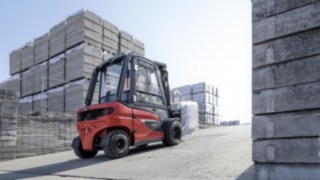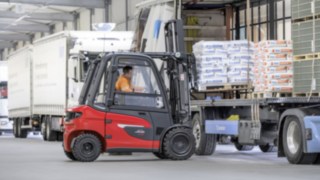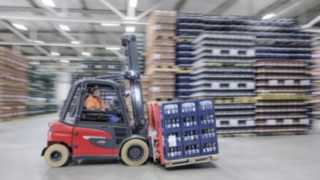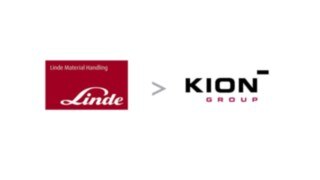
Green power for goods handling
16 Jun 2021
New electric forklifts from Linde Material Handling reach the performance level of IC trucks
The new Linde X20 – X35 electric forklift models in the load capacity range from 2.0 to 3.5 tons are the first electric trucks to match the performance and robustness of Linde’s hydrostats, while offering the additional environmental benefits of battery-powered operation. Along with the likewise new electric trucks for standard applications (Linde E20 – E35), they are based on the same platform as the Linde H20 – H35 internal combustion trucks launched at the end of 2019. This ensures shorter delivery times, readily available options and an almost identical operating concept for the driver.
More and more companies are turning to electric forklifts to make their intralogistics as sustainable and climate-neutral as possible. These battery-powered vehicles do not give off any emissions during operation and do not produce any harmful CO2 so long as the electricity is generated from renewable sources such as wind, solar or biomass. The only shortcoming of this type of drive is the fact that for certain applications, IC trucks still demonstrated superiority. That is until recently. “Many of our customers were keen to switch to electric trucks, but they were not willing to forego the familiar performance, ground clearance, robustness, decoupled driver’s cabins and the ergonomic features offered by Linde hydrostats,” says Björn Walter, Senior Product Manager Counterbalance Trucks at Linde Material Handling. In addition to sustainability, there are other reasons that make the use of electric trucks attractive: self-generated electricity, for example, which enables the industrial trucks to be operated cost-effectively, or the quiet engines that prevent noise pollution in the vicinity.
However, when it came to developing a powerful, robust electric forklift, those responsible for the project at Linde Material Handling quickly realized that it would not be possible to achieve the desired results by simply increasing the power output. “That’s why we decided to design a completely new model series that combines the positive characteristics of our IC trucks with the advantages of traditional electric trucks. These represent a real alternative for our discerning customers, particularly those in the construction materials, beverages, steel and iron, paper, wood and recycling sectors where applications are extremely demanding,” reports Björn Walter. “At the same time, there still had to be an extremely maneuverable standard electric forklift truck available – which should of course be equipped with all the new functionalities of the platform concept.” In line with this idea, Linde now offers two electric truck model series in the 2.0 to 3.5 ton load capacity range: the standard Linde E20 – E35 series and the particularly robust and powerful X range – the Linde X20 – X35.

The new Linde X20 – X35 electric forklift models represent a real alternative to Linde IC trucks for discerning customers, particularly those in the construction materials, beverages, steel and iron, paper, wood and recycling sectors.

The new Linde X20 – X35 electric forklift models represent a real alternative to Linde IC trucks for discerning customers, particularly those in the construction materials, beverages, steel and iron, paper, wood and recycling sectors.
New equation: E = V
Linde X20 – X35 series trucks are capable of meeting performance standards where conventional electric trucks reach their limits. These include, among other things, mastering large gradients, achieving long-term high handling rates, and operating in the presence of large amounts of dust and dirt.
To achieve this level of performance, motors based on synchronous reluctance technology (SRM) are used in both model series. This improves the efficiency of traction motors and hoist motors by up to 5 percent, resulting in corresponding efficiency gains overall. Two more technical highlights take the Linde X20 - X35 series up to the performance level of an IC truck: firstly, the motors are additionally equipped with neodymium magnets, and secondly, the water cooling of the power modules ensures that performance can be provided over a long period of time without any restrictions, e.g., in multi-shift operation.
Comparative tests based on the TÜV-certified performance test developed by Linde MH delivered two key results: “On one hand, the Linde X20 – X35 series was just as powerful as the Linde H20 – H35 in terms of goods handling, and on the other hand, it performed significantly better than all the competitor vehicles with regard to the handling time and costs per pallet moved,” the Senior Product Manager points out.
Important for outdoor applications is the fact that Linde X20 – X35 trucks can handle very uneven ground, just like IC trucks. This is enabled by the long wheelbase, the large tires and the elastomer ring bearings used as shock absorbers on the front axle. They prevent vibrations and shocks triggered by uneven ground from being transmitted to the operator via the wheels. All in all, this reduces physical stress so that a consistently high level of work performance by both man and machine is made possible. Fully sealed or encapsulated units in the battery and engine compartments ensure imperviousness to dirt and dust particles. Sufficient energy is provided by the lithium-ion system developed by Linde Material Handling: it consists of shock-resistant high-performance batteries and chargers of varied dimensions, all designed to be exceptionally safe.

Both electric forklift truck series and the IC trucks of the current model range from Linde Material Handling are based on one and the same platform concept. Just like the weather protection cab with fully glazed doors, most of the other options of the IC truck are also available for the electric forklifts.

Both electric forklift truck series and the IC trucks of the current model range from Linde Material Handling are based on one and the same platform concept. Just like the weather protection cab with fully glazed doors, most of the other options of the IC truck are also available for the electric forklifts.
Multiple advantages of the platform concept
If an electric forklift truck is required for indoor use on smooth industrial floors or if narrow rack aisles make material handling difficult, the traditional version of the new electric forklift is available. The compact dimensions of the Linde E20 – E35 models and the combi-steering axle developed by Linde Material Handling allow turning maneuvers on the smallest radius. There is also a choice of different energy options: lead-acid battery, lithium-ion battery or fuel cell systems. Existing batteries can also still be used. A pallet truck is now all that is needed for a sideways battery change.
Both electric forklift truck series and the IC trucks of the current model range are based on one and the same platform concept. This means that operators benefit from excellent visibility between the mast sections, to the sides, to the rear and upwards. Just like the weather protection cab with fully glazed doors, most of the other options of the IC truck are also available for the electric forklifts. The optional, fully integrated air conditioning system with eight-nozzle ventilation system provides powerful cooling and heating to ensure operator comfort and thus high productivity in all ambient conditions, while the optional “Linde Motion Detection” driver assistance system provides greater safety: Sensors register motion behind the forklift and prevent it from reversing if there are people or other vehicles in the vicinity.

Linde X20 – X35 series trucks in the 2.0 to 3.5 ton load capacity range are capable of meeting performance standards where conventional electric trucks reach their limits. These include, among other things, mastering large gradients.

Linde X20 – X35 series trucks in the 2.0 to 3.5 ton load capacity range are capable of meeting performance standards where conventional electric trucks reach their limits. These include, among other things, mastering large gradients.
The 12XX truck generation also sets standards in terms of operational availability. Maintenance requirements for the robust design are low due to its reduced susceptibility to wear and tear, and essential assemblies operate wear-free. Networked service processes and the new Truck Health Management system based on the wireless transmission of vehicle data help to further increase vehicle availability.
Interchangeable parts and mixed assembly create advantages
The platform concept and the resulting larger number of interchangeable parts create further advantages, ranging from assembly on a common mix conveyor and thus simpler logistics as well as greater flexibility in the event of production fluctuations, to the possibility of swapping components between different models and quickly retrofitting rental trucks. All three forklift types have a nearly identical layout of control elements, meaning that operators hardly notice when switching between vehicles. Last but not least, new options will be available simultaneously for all models of each respective load capacity class. As Björn Walter concludes: “Linde Material Handling is the first manufacturer to offer its customers an uncompromising electric truck alternative alongside its IC forklifts that are still the most powerful on the market!”

